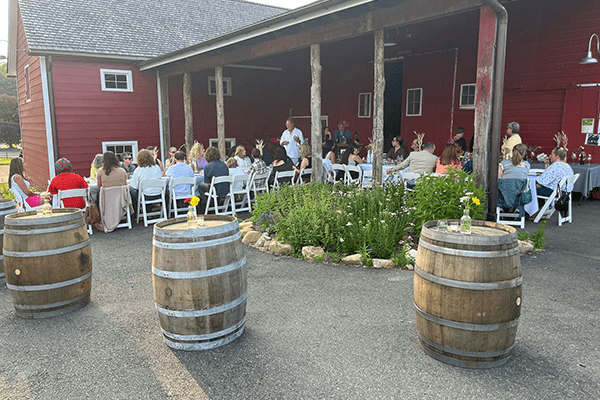|
RCBJ-Audible (Listen For Free)
|
Sue Ferreri Is Working To Bring “Agricultural District” Status To 25-Acre Farm To Prop Up Its Viability
By Tina Traster
Over the long Thanksgiving weekend, I had the privilege to spend time in the heart of Pennsylvania’s Amish Country – a tapestry of gorgeous idyllic farms dotted with clapboard and stone farmhouses, cows, horses, goats, sheep, chickens, and of course the jet-black horse buggies that complete a nineteenth-century tableaux of rural America.
“The pressure we’re feeling is that there’s such a demand for our educational programs, for farming, for our veggies,” said Ferreri. “To scale and grow, we need funding.”
Agriculture has been a way of life for the Amish for centuries and the preservation of both the land and their lifestyle speaks to both steadfast ritual and determination. Farming is tough backbreaking work, subject to the whims of Mother Nature, yet it is the backbone of their existence.
Outsiders admire the enormity of this feat; tourism in the region is so robust because this nod to our agricultural past rouses a feeling of nostalgia, a glimpse of an America most only see in folk art paintings or in country stores selling kitsch. It gets us thinking about the communities we live in – and what remains. In Rockland County, the answer is very little, in terms of farmed land. Which is why it is so important to do more than think about what it takes to preserve it.
The case in point here is the nonprofit Rockland Farm Alliance, founded in 2007 on the former Cropsey Farm in New City. The 25-acre farm, once operated by the Cropsey family, is jointly owned by Rockland County (61 percent) and the Town of Clarkstown (39 percent). The nonprofit Alliance leases 25 acres but farms roughly five acres.
Rockland Farm Alliance, run by a board, but helmed by Executive Director Sue Ferrari for nearly three years, is a sacred oasis in a county that is increasingly losing open space to development pressure, including housing subdivisions and warehouses. One of just a handful of farms left in a once-rural county, the acreage is not only a plot for growing a cornucopia of veggies including cucumbers, pumpkins, lettuce, eggplants, radishes and more – it is a stage for education and community events. It’s a transport to the past, a hopeful experiment for the future.
And while this swath of Rockland has been preserved and protected, the responsibility for its continued prosperity must fall on the shoulders of many, according to the Alliance.
“The pressure we’re feeling is that there’s such a demand for our educational programs, for farming, for our veggies,” said Ferreri. “To scale and grow, we need funding. Funding to help support payroll, more educators, farming equipment. There are so many challenges running a farm.”
Anyone who’s met Ferreri knows she is a turbo-charged multi-tasker who’s raising a large family of her own while running a complex agricultural matrix in the middle of suburbia. Though the farm is visible – and a recognized community asset – it is not necessarily top of mind as a cause in need of donations.
“People don’t see us as something to donate to,” said Ferreri. “Donations have dried up since COVID.”
But Ferreri said support is exactly what it needed to keep educational programs afloat and monies available for 20 full and part-time workers. The growing season in 2023 was disastrous for farms regionally, deluged by constant, pounding rains and early days of heat in late spring. The year before the farm battled drought.
“We lost 50 percent of our potential yield this season,” said Sophie Vranian, the farm manager. “Typically, we’d bring in $90,000 in revenue; this year we grossed $56,000 on crops.”
This past growing season, the farm’s brush hog, made in 1962, broke down.
“We literally had to get someone to hand-make a piece to fix it,” said Ferreri, “It would cost $10,000 to replace a piece of equipment like that.”
The farm relies on multiple revenue streams including a farm store, $60,000 from Rockland County annually (which has increased 10 percent each year), state grants, Community Block Grants, and corporate and individual donations. Two school districts, Clarkstown and North Rockland, pay $20 per student for second graders to visit the farm eight times over the school year and participate in educational programs. The farm also supports itself with a fall festival and winter holiday market, as well as an annual fundraising dinner.
But it’s barely enough.
“If our tractor broke down, it’d cost us $80,000,” said Ferreri. “That’d put us in a bind.”
The Alliance’s projected operating budget is $800,000 for 2024, which has risen from $615,000 in 2023.
Rockland Farm Alliance is a young entity though the Cropseys farmed for nearly a century. John McDowell and his wife Alexandra Spadea-McDowell co-founded Camp Hill Farm in Pomona in 2004; the musician and his wife dared to believe 21st century farming was possible in Rockland County. The Rockland Farm Alliance was formed in 2007. Since Ferreri stepped in as Executive Director, she has inhabited her role with complete dedication. She joined the New York State Farm Bureau, seeking support from farmers who’ve been mucking stalls and growing crops for decades, who’ve weathered rains and pests, who’ve stepped up to the demand for farm-grown produce at farmers markets, but whose children have left the farm.
Now, Ferreri is hoping to reassemble a board that dissolved in 2019 that aimed to get the Farm Alliance designated as an “Agricultural District” in Rockland County.
“If our tractor broke down, it’d cost us $80,000,” said Ferreri. “That’d put us in a bind.”
An “Ag District” is a geographic area consisting predominantly of viable agricultural land. Agricultural operations within the district are the priority land use and afforded benefits and protections to promote the continuation of farming and the preservation of agricultural land. In practice, districts may include land that is actively farmed, idle, forested, as well as residential and commercial.
“We are hoping to bring the “Ag” board back together,” said Ferreri, “There has been interest from the town, county, and all local farmers. We hope to schedule our first meeting in December or January.”
If there’s one thing that’s obvious about farming – be it in Rockland or among the picture-perfect Amish farms in Pennsylvania – it’s oxygen is support, cooperation, and a will to survive. The stewardship of agricultural lands is a shared mission.










